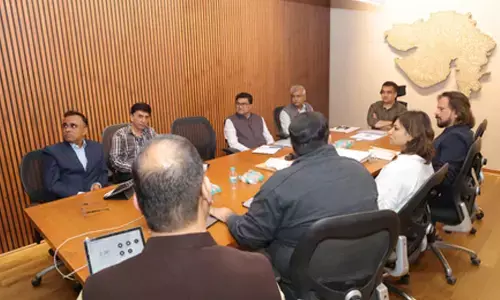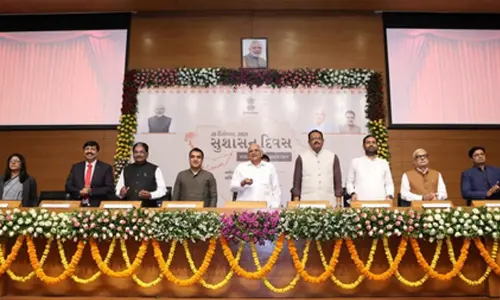Strategy to choose Public Administration as optional subject

Most aspirants of civil services have opts the Public Administration as optional subject. But, the recent performance of Public Administration has not been very encouraging. A number of factors have contributed to the same which include relatively tougher papers; abstract questions; stricter evaluation; less generous marking; mysterious scaling/moderation by UPSC etc.
Most aspirants of civil services have opts the Public Administration as optional subject. But, the recent performance of Public Administration has not been very encouraging. A number of factors have contributed to the same which include relatively tougher papers; abstract questions; stricter evaluation; less generous marking; mysterious scaling/moderation by UPSC etc.
However, as the number of ‘Pub Ad’ applicants reduces year by year (given its performance), it may be assumed that the present trend is unlikely to continue for long.
But, apart from these factors that are ‘external’ to the aspirants, some ‘internal’ factors also have contributed to the subject’s overall below par performance. Choosing ‘Pub Ad’ based on bandwagon effect; writing very general answers in Paper-2; not stressing enough on basics; attempting to write scholarly answers etc. are some of the most prominent factors.
It is because of some of these general mistakes made frequently by aspirants that they end up scoring low in ‘Pub Ad’. And, the situation becomes even more difficult when these mistakes are not figured out.
To address these issues, a detailed strategy needs to be adapted to scoring good marks in Public Administration, you will need the following:
- More awareness needed to understand the concepts
- Ability to express the concept clearly (logically) on paper which requires a lot of writing practice
- Ability to relate the subject with current affairs especially administrative and political issues.
- Ability to substantiate your argument with facts, evidence, and committee reports etc.
Imparting these angles to almost every answer that you write
- Backing you answer with theoretical foundations and perspective of various thinkers
- Contemporary Administrative Practices
- Comparative Public Administration angle
Reasons to choose or not choose Public Administration?
You should NOT take the subject solely because
- Some neighbour/friend/ relative/ acquaintance IAS officer took it and scored good marks
- It overlaps with GS II, III & IV substantially
- Syllabus is shorter and can be finished earlier than most other optional papers
- It seems easy to comprehend and effort is less
You should GO for it
- If administrative matters in general genuinely evoke your interest
- If you enjoy reading highly abstract and theoretical stuff for e.g. perspective of administrative thinkers
- If you really like reading Indian Polity.
- If you have some experience of working in an organization and you have begun to show interest in group management/organizational behaviour/personnel management etc.
But, please do not choose the subject if you are not interested in it. This might sound cliché but that is the eternal truth. A lot of aspirants take this subject and lose interest after some time. They cover the syllabus, understand the subject, do writing practice too; but here is a catch.
Understanding a subject and expressing it on paper showing that you have understood it are two entirely different ball games. This is where most of the candidates miss it.
For e.g. you might study Chester Bernard’s ideas and feel confident about your grasp. But if you answer a twisted question on Bernard, you will notice that your writing suffers from incoherence, looks abstract and lacks a logical flow. This gives a bad impression to the examiner and you will be awarded low marks despite your intuitive understanding of the topic.
Public Administration is not rocket science. It is very easy to understand. But, to understand it in a way so that you can express it beautifully on paper requires you to spend considerable time with the subject. You will need to read the same book 5-6 times and until you internalize the entire vocabulary of Public Administration, the job is not done. You will need to understand the subject both intuitively and logically.
To do the above, you really need a strong interest in the subject. Otherwise, reading becomes a ritual and ritualistic reading leads nowhere.
While falling in love with Public Administration might sound outlandish, nothing less works.
Strategy for Paper-1
For clear concepts, you need to refer books that deal with the subject in the simplest manner possible. Avoid poorly edited books or coaching material that may seem to cover the entire syllabus because they will not add much to your conceptual clarity.
Before referring any book, go through previous year papers of 20 years for that topic to become acquainted with the demand of the subject.
Introduction:
- Read it from Sharma and Sadana or S Polianaidu.
- Supplement your reading with Mohit Bhattacharya.
- It will enrich your perspective.
- Almost all the pages will be important.
- We see little possibility of converting them into short notes.
- But you should jot down key ideas and concepts after second reading.
- Do not make notes right after first reading as you will not have a broader outlook of the subject and you may write everything in your notes.
Administrative Thought:
- One and only Prasad and Prasad should be referred for this.
- Since questions will inter-link thinkers, try relating the theory of one thinker to that of other.
- Also read the background of the thinker.
- You can always correlate his theories with his background for e.g. Max weber ideas on bureaucracy were also a product of him being under the German authoritative system of the 1920s.
- Underline important lines/keywords like Mental Revolution, Zone of Indifference etc.
- Do try to remember some lines of these thinkers verbatim.
- It adds value to your answers in exam.
- Also, learn to apply these theories in real life administrative situations. UPSC has been asking case studies on the same.
- For e.g. you can relate Mcgregor’s theories to the present condition of the lower bureaucracy in India.
Administrative Behaviour:
- Sharma and Sadana covers it pretty exhaustively.
- For motivation theories of Herzberg, Maslow etc, you can also refer to Prasad and Prasad.
- There is immense scope of making short notes here. The topics are also very easy to understand.
Organisations:
- Refer Sharma and Sadana for all topics except PPP.
- For PPP refer Fadia and Fadia. Please do not refer Fadia for other topics because this book is poorly edited; very repetitive; lacks coherence and clarity.
- There is a lot of scope for relating this part to the Indian administration (paper-2).
- Quote examples and facts from the Indian context in answers. You need not necessarily quote international examples.
Accountability and control;Administrative Law:
- For both of them refer Sharma and Sadana.
- For dynamic topics like Civil Society, Right to Information, Citizen Charters keep an eye on international and national developments.
- Quote them heavily in your answers. Use small case studies if possible.
Comparative Public Administration;Development Dynamics:
- Ramesh K Arora – CPA is a brilliant book.
- It is a small book and covers the topic exhaustively.
- You can be assured of answering even the most twisted questions on CPA.
- For those who don’t have Arora, refer S. Polianaidu.
- Even though he covers CPA in a fragmented manner, it covers the topic thoroughly.
- Development administration is covered better in Polianaidu.
- Try to use cross-cultural examples heavily in answers.
- For e.g. Pakistan is an unbalanced polity with military at the helm of affairs in major policy matters; but India is a balanced polity where all organs of the government get their due share in policy making.
Personnel Administration:
- Sharma and Sadana should be referred.
- Prince Dhawan (AIR-3, CSE 2011) rightly pointed out this topic should be covered along with Civil Services of Paper-2.
Public Policy:
- IGNOU BA and MA Public Policy cover it thoroughly.
- There will be various modules that cover the same topic in BA and MA modules. So read it selectively.
- You can analyse present Indian policy decisions with respect to the various models given here.
Techniques of Administrative Improvement:
- There is no single good source.
- Mohit Bhattacharya covers in a scanty manner, nevertheless go through it once.
- You will need to rely on the internet mostly. Questions from these topics do not carry much weight age.
Financial Administration:
- Combine this with Financial Management from Paper-2.
- Both can be covered from Sharma and Sadana and current events in India.
- A lot of questions are being asked from this area. Prepare it well.
- Try making consolidated notes of both theoretical financial administration and Indian financial management.
- After reading all these books once, go through Mohit Bhattacharya which is often called as the “Gita” of Public Administration.
- After finishing this book, you will begin to see the entire subject much more clearly and seamlessly connected.
- A lot of questions come directly from this book.
- Also, this covers the “new horizons” of Public Administration like Network Governance; Feminism in Administration etc. which may not be found in other traditionally rooted books.
- Now, go through previous year papers again.
- Try answering questions. If you cannot, you will need a few more readings.
- Start making notes from all these books in the second or third reading. Revise your notes as frequently as possible and as many times as possible.
- Understand the subject in and out. When you write, this understanding should reflect on paper.
Strategy for Paper-2
We need not pinpoint different books for different topics here because you only need to refer three sources: Indian Administration by Rajni Goyal and Ramesh Arora
Making notes is not very useful as a large part of the syllabus coincides with Indian Polity of GS-II. The book covers almost all topics exhaustively
Second ARC reports
- It covers the rest of the issues.
- These are very high quality reports.
- Its recommendations should be used heavily in your Paper-2 answers.
Also try to make short notes. Reports that should be referred are:
- Personnel Administration
- State and District Administration
- Public Order
- Disaster Management
- Local Government
- Ethics in Governance (Selectively)
- Other topics are mostly dynamic.
Newspapers are the best source.
- The Hindu, Indian Express, Hans India and Livemint editorials frequently comment on administrative matters.
- Also note down any new policies, plans, committees etc. Make issue-wise notes.
- Questions from current issues have a very high weightage. Do not ignore these at any cost.
- You will also need to quote facts/examples/ideas from the editorials quite often in your answers.
- You need not refer to IJPA journals.
- Even if you refer them where will you use the content in your answers? IJPA journals are PhD plus stuff. You only need a graduate plus level of understanding here.
Answer Writing
- There are no separate strategies for Paper-1 and Paper-2.
- In both the cases you will need to give Indian examples, write logically, and present arguments from both sides.
- Once you internalize the subject, answer writing will not require a lot of effort.
- But, if you have read the subject only once, you may face problems in presenting your viewpoint logically.
Keep the following in mind while writing answers.
- Do not write general answers as you write in GS.
- They should be ‘Pub Ad’ answers.
- Use administrative terminology from the subject; quote thinkers and theories in your answer; and explore the issue on administrative lines.
- For e.g. if a question on reducing the size of Indian Cabinet comes, you should be able to write its positive and negative implications based on delegation and decentralization; efficiency; organizational behaviour; informal grouping angle etc.
- In paper-1 especially, try relating your answer with the basic theories, contemporary and cross-cultural practices. For e.g. in comparing the strength of executive accountability to legislature, compare that of US and India.
- You can also quote that in 2013 US Congress stopped fund flow to the executive.
- Such financial control is difficult to achieve in India given the dominance of executive in the Indian Parliament.
- Also, try to cover almost any answer right from its basics. For e.g. if a question on comparison between Bernard and Simon comes, you should first clearly state what both thinkers claim, and then explore similarities or dissimilarities.
- Same works for Paper-2 as well. For e.g. when writing an answer on local government, start from the basic provisions in the constitution relating to that question. When analysis of a policy or judgment is asked, first give a small introduction of the policy.
- Try to quote committees like Punchhi, 2nd ARC, Sarkaria in your answers wherever possible. For e.g. there was a question in 2014 on the possibility of giving regulatory powers to the PRIs apart from developmental functions.
- You can directly quote both 2nd ARC and Padmanabhaiah committee that recommend giving local policing powers to PRIs. The answer looks richer this way making a good impression on the examiner.
- You can write either in paragraphs or points. A mixture of points and paragraphs written under sub-headings give a structure to your answer, and make the job of the examiner easier.
- Finally, do not write in a complicated language. Use Simple English in an administrative style with short sentences covering relevant examples after every one-two paragraphs.
- UPSC is not looking for scholars of Public Administration. You should only be able to state the concept clearly on paper and take a fair stand on issues after giving appropriate arguments and evidence from both sides. That is enough.
















